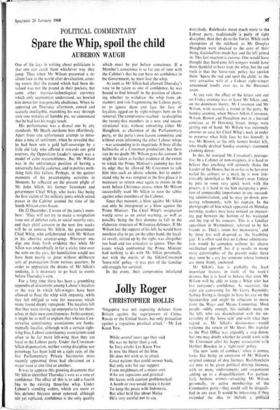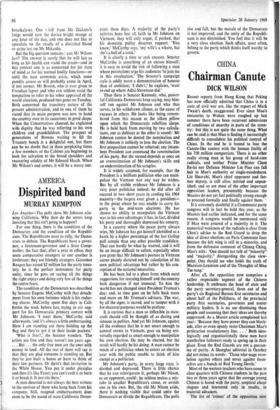Spare the Whip, spoil the child
POLITICAL COMMENTARY AUBERON WAUGH
One of the joys in writing about politicians is that one can catch them whichever way they jump. Thus when Mr Wilson presented a re- silient face to the world after devaluation, assur- ing voters that the pound which had been de- valued was not the pound-in their pockets, but some other rnystico-technological currency which only economists understood, we howled him down for irresponsible ebullience. When he appeared on Thursday afternoon, cowed and scarcely intelligible, mumbling his way through sixty-one minutes of humble pie, we announced that he had lost his magic touch.
His performance was a dismal one by any standards. Mr Heath outshone him effortlessly. Apart from one unfortunate attempt to intro- duce a note of sentiment, when he revealed that he had been sent a gold half-sovereign by a little old lady who offered it towards our gold reserves, the Opposition Leader's speech was a model of calm reasonableness. But Mr Wilson was in the unfortunate position of having a universally hostile audience, and in politics noth- thing fails like failure. Perhaps, in the quieter moments of his peacekeeping activities in Moscow, he reflected on the present plight of Mr John Silkin, his former lieutenant and government Chief Whip, who looks like being the first victim of the military junta which seized power in the Cabinet around the time of the South African arms fiasco.
On 22 December, I wrote of the junta's mem- bers: 'They will not try to make a resignation issue out of defence cuts, or social security cuts, and their chief concern in the next few weeks will be to remove Mr Silkin, the government Chief Whip, who collaborated with Mr Wilson in his abortive counter-coup. Wherever one digs one finds fresh evidence that while Mr Silkin was undoubtedly in for a sticky time over the -vote on the cuts, his humiliation would not have been nearly so great without deliberate acts of provocation from various quarters. In order to appreciate the drama of Mr Silkin's undoing, it is necessary to go back to events before Thursday's vote.
For a long time there has been a grumbling appendix of discontent among Labour's loyalists at the way in which left-wingers have been allowed to flout the whip with impunity, while they felt obliged to vote for measures which many found deeply repugnant. The loyalists felt that they were storing up unpopularity for them- selves in their own constituencies. In this context, it might be as well to explain that whereas Con- servative constituency associations are funda- mentally loyalist, although with a certain right- wing bias, Labour constituency associations tend often to be far more left-wing than they are loyal to the Labour party. Under the Crossman- Silkin dispensation, neither voting discipline nor patronage has been held on a tight rein; of the five Parliamentary Private Secretaries most recently appointed three had abstained on a major issue at one time or another.
It was to appease this growing discontent that Mr Silkin identified Thursday's vote as a vote of confidence. The effect of this is to add a fourth line to the existing three-line whip. Under Labour's standing orders, which are more or less defunct because never renewed, although not yet replaced., Confidence is the only quality which must be put before conscience. If a Member's conscience is so far out of tune with the Cabinet's that he can have no confidence in the Government, he must lose the whip.
As soon as Mr Silkin had allowed Thursday's vote to be taken as one of confidence, he was bound to find himself in the position of choos- ing whether to withdraw the whip from ab- stainers, and risk fragmenting the Labour party, or to ignore them and face the fury of loyalists, egged on by right-wingers bent on his removal. The compromise reached—to discipline the twenty-five members in a new and uncon- stitutional way, without consulting either Mr Houghton, as chairman of the Parliamentary party, or the party's own liaison committee and without even informing the other Labour whips —was astounding in its ineptitude. It bore all the hallmarks of a Crossman production, but there can be no doubt Mr Wilson gave his consent. It might be taken as further evidence of the extent to which the Prime Minister's cunning has lost its edge that he allowed Mr Crossman to talk him into such an idiotic scheme, but to under- stand why he was tempted in the first place it is necessary to return once !tgain to events in the week before Christmas recess, when Mr Wilson successfully used Mr Silkin to turn the tables against other members of the Cabinet.
Since that moment, a blow against Mr Silkin can only be interpreted as a blow against the Prime Minister. The Chief Whip's resignation would serve as an awful warning, as well as possibly being the first domino to fall in the elaborate structure of Wilsonian defences. If Mr Wilson lost the support of his left, he would have nowhere else to go; on the other hand, the loyal- ist revolt, stirred up by the right, was altogether too loud and too articulate to ignore. Thus the issues which confronted the Prime Minister had nothing to do with Mr Silkin personally, nor with the merits of the Silkin-Crossman loose-rein' policy—it was part of the familiar old struggle for survival.
In the event, their compromise infuriated everybody. Rulebooks mean much more to the Labour party, traditionally "a party of tight discipline, than they dO to the Toriei. While such champions of the rulebook as Mr Douglas Houghton were shocked to the core of their being, Gaitskellites made hay and the left joined in. This last reaction is curious. One would have thought that hard-core left-wingers would have been thankful to have kept the whip, but the sad truth is that the loose-rein' policy has spoiled them. 'spare the rod and spoil the child,' as the very attractive wife of a Labour right-winger announced loudly over tea in the Harcourt
MOM.
At any rate, the effect of the letters sent out on Friday evening was to leave Mr Silkin, and, on the dominoes theory, Mr Crossman and Mr Wilson, with scarcely a friend in the party. By Sunday evening, when Messrs Silkin, Crossman, Wilson, Brown and Houghton met in a hurried conclave at 10 Downing Street, things were getting out of hand. Mr Wilson was extremely anxious to save his Chief Whip's neck in order to preserve what little face he has himself; it was Mr Brown, as the only honest broker left, who finally drafted Sunday evening's statement climbing down.
In this, he usurped Mr Crossman's preroga- tive. In a Cabinet of non-resigners, it is hard to believe that. anything will seriously shake the Leader of the House, but in so far as he has ever nailed his colours to a mast, he is now irre- trievably identified as Mr Wilson's man. Unless he puts in some very quick work with the pincers, it is hard to see him occupying a posi- tion of comparable importance in any succeed- ing administration, and he may go down, pro- testing vehemently, with his captain. In the photographs of him which appeared on Monday morning, readers may have noticed an interest- ing gap between the bottom of his waistcoat and the top of his trousers. This is a familiar apparition in Westminster, referred to by his friends as 'Dick's room for manoeuvre,' and by those less well disposed as 'the feasibility gap.' It is often said that no Labour administra- tion would be complete without his cheery intellectual spin-off, but if it results in many more catastrophes of the present order there may soon be a cry for someone whose trousers are more firmly anchored.
Mr Silkin's fate is probably the least important feature, in itself, of the week's dramas, but it is hard to believe that even Mr Wilson will be able to keep a Whip who has lost everyone's confidence. As successor, the right are canvassing for Mr Gerry Reynolds; Sydney Irving is thought to have his eye on the Speakership and might be reluctant to move from the Ways and Means Committee. Most people—oddly enough, this includes many on the left, who are disenchanted with the un- certainty of the 'loose rein' and with what they regard as Mr Silkin's deviousness—would welcome the return of Mr Short. His transfer to the Post Office was arguably a step down; but one may doubt whether he could work with Mr Crossman after his happy association with Herbert Bowden in a 'tight-rein' policy.
• The new 'code of conduct,' when it comes, looks like being an extension of Mr Wilson's original concept of dog licences. Backbenchers are now to be given political driving licences, with so many endorsements and suspensions adding up to a disqualification. For particu- larly heinous crimes—attacking Mr Wilson personally, or active membership of the Communist party—they could still be disquali- .fied in any case. It ivotild be interesting if They extended the idea td ' i'rfclud a ' politidal breathalyser. One hiff from Mr Dickens's lungs would turn the device bright orange at any. hour of the day, and one does not like to speculate on the results of a doctrinal blood or urine test on Mr Mikardo.
But the big question remains : can Mr Wilson last? The answer is surely that he will last as long as his health can stand the strain—and in this context one is as concerned for his state of mind as for his normal bodily functions—or until the next economic crisis, which some pundits assure us will probably come in April, if not sooner. Mr Brown, who is ever given to Freudian lapses and who can seldom resist the temptation to refer to his sober appraisal of the world situation, produced two gems on Tuesday. Both concerned the transitory nature of the present administration, and in one of them he stated that its main purpose was now to hand the country over to its successors in good shape. When the Conservatives cheered, he explained with dignity that he was referring to his own children and grandchildren. The prospect of generations of Browns waiting to fill the Treasury bench is a delightful one, but there can be no doubt that in these perplexing times a few members of the Cabinet are beginning to look for salvation to the broad shoulders and reassuring solidity of Mr Edward Heath. When Mr Wilson's end comes, it will be a messy one.



































 Previous page
Previous page